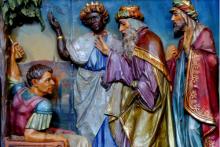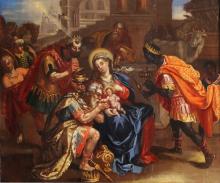magi

A bitter trudge under star-faces.
The Pleiades mocking in their blueness.
The balance of Heaven swallowed whole
By the shocking bloom of the new light bursting.

Mysterious people with political connections arrived from a country off in the East. They brought news the ruler did not like. There was a new claim to the throne. An effort was underway to remove him and install another ruler. King Herod wanted to dismiss the claims as “fake news” and a “hoax” — not because the intelligence report was inaccurate, but simply because he didn’t like the news. These Magi, after all, had done their research.

The Magi finally appeared in nativity scenes over the weekend. Soon, if not already, they’ll be packed and stored away until next year’s Epiphany, which is a shame. These late arrivers are some of the most provocative, prophetic, and polarizing figures in the Christmas story, and we need to learn their lessons and carry them forward.

You probably don’t think of Christmas as a revolutionary holiday. Twinkling lights on trees, Starbucks gift cards, and sweet carols are not exactly the stuff of subversion. A domesticated Christmas is comforting, but considering our fraught political landscape today, we might find better lessons by reflecting on the disruption caused by Jesus’ birth, and the radical implications of his life.

The turn of each calendar year is often filled with an influx of charitable giving, much of which intends to assist those far beyond the borders of the United States. As rigorous debates surround the ethics and oversight of such foreign assistance endeavors, one of the more innovative contributions to this important conversation was produced by South Africa's renowned theologian, the late Steve de Gruchy. In consideration of the Magi and their Epiphany visit with Joseph, Mary, and the newly born Jesus in Matthew 2:1-12, de Gruchy offers a striking interpretation of the biblical text and considers its direct relationship with international relief efforts. As private giving directed to foreign aid continues to grow ( from $8.4 billion in 2000 to $19.1 billion in 2012 ), de Gruchy shows how benevolent intent can lead to oppressive impact, and Epiphany provides important wisdom to navigate the complexities of our policies and practices.

Ah, Christmas! The most wonderful time of the year. A time to gather with family and friends, and, with a smile on our faces, pretend we aren’t quietly measuring who received the best present and which relative really, really needs to stop drinking. A time to hang tinsel and baubles from the tree, and a time to hang up our hopes of losing that last 10 pounds this year. Such a joyous season!
The real point here is that Christmas is what we make of it. For Christians, however, there are some very specific things you can’t do if you want to actually honor and follow the person we celebrate this season. So, I give you my “10 Things You Can’t Do AT CHRISTMAS While Following Jesus.” As with my other “10 Things” lists, this is not intended to be a complete list, but it is a pretty good start.

One of the most fresh and challenging interpretations surrounding the Christmas narrative was produced by South Africa’s renowned theologian, the late Steve de Gruchy. In regards to the Magi and their visit with Joseph, Mary, and the newly born Jesus in Matthew 2: 1-12, de Gruchy offers a striking proposal surrounding the biblical text and its direct relationship with cooperative efforts between those in the so-called global north and south.
...
Among other things, a key insight into this portion of the Christmas narrative is that God is revealed through the vulnerability of poverty and marginalization. The main characters of the Christmas plot are not wealthy and prosperous high-rollers, but the downtrodden and vulnerable poor who stand as deliberate reminders of how God is in solidarity with those who are too often forgotten and oppressed. If Mary and Joseph were people of wealth and privilege, they surely would have received room at the inn, yet God shows an alternative to the common hierarchies of status in our world, and such pushed-aside people are given highest priority as the bearers of Christ.

"NO ONE SPEAKING by the Spirit of God ever says, 'Let Jesus be cursed!'" insists Paul in his first letter to Corinth (12:3). Driving through Corinth not long ago, I found myself musing about the extraordinary spirituality that had grown up in the church he was trying to straighten out. Apparently, ecstatic worshippers caught up in charismatic excitement on the Lord's day were actually known to blurt out these shocking words: "Anathema, Jesus!" In a very brief period, the church there had come up with a mutation of the gospel in which only the cosmic, exalted savior, known through speaking in tongues and exciting miracles, mattered. The earthly person of Jesus of Nazareth had been a mere husk to be shucked off, they said. Only the Spirit-giving celestial Lord mattered. Jesus be damned! His teachings back in Galilee signified nothing; now they could concentrate on the prophecies that came hot and strong from heaven through the church's prophets—a belief that left plenty of room for all sorts of wild ethical "experiments," to put it mildly.
Well, no one actually utters "Let Jesus be cursed" out loud anymore, but, in a more subtle way, how prevalent is a pseudo-spirituality that relativizes the radical teaching of the reign of God! These readings bring us back under the authority of Jesus' witness in Galilee—and the reality that there is no Spirit, and no spirituality, except the one we receive as the driving energy to bring good news to the poor.

Activist theologian Bill Wylie-Kellermann wrote that the Epiphany season "begins and ends in light. From the heavenly star to the radiant robes of transfiguration, Epiphany is about revelation, the kind of sudden brightness that lights up the landscape of a mind or a community or a whole social order. The light reveals, but not passively; it summons and sends."
In popular understanding, of course, Epiphany is about the visit of the Magi, "wise men" from the East bearing gifts for the newborn Christ child. Since these Gentile visitors come from foreign lands, their search for Jesus and their homage to him have stood as sign and symbol that Christ's salvation knows no boundaries. (The parallels with our age, with the potential of digital media to transcend all boundaries, begin to suggest themselves.)
The story of the Magi has a dark side as well, mostly ignored in Christendom's celebration of Epiphany. On their way to find the babe, the travelers pay a visit first to Herod's court, where they're told to report back to him the location of the newborn. Fortunately, the wise men practice direct civil disobedience to the royal command, and thus they and the holy family escape Herod's wrath. But the children of Bethlehem, the "holy innocents," suffer the tragic consequences of Herod's duplicity. The lessons about relating to authority (i.e., the need to be "wise as serpents") are loud and clear.


I’d like to share some Advent reflections from my former professor at North Park University, Scot McKnight. He is in the midst of a series that points to what Advent is supposed to remind Christians of. It’s a simple message with deep meaning: Jesus is King.